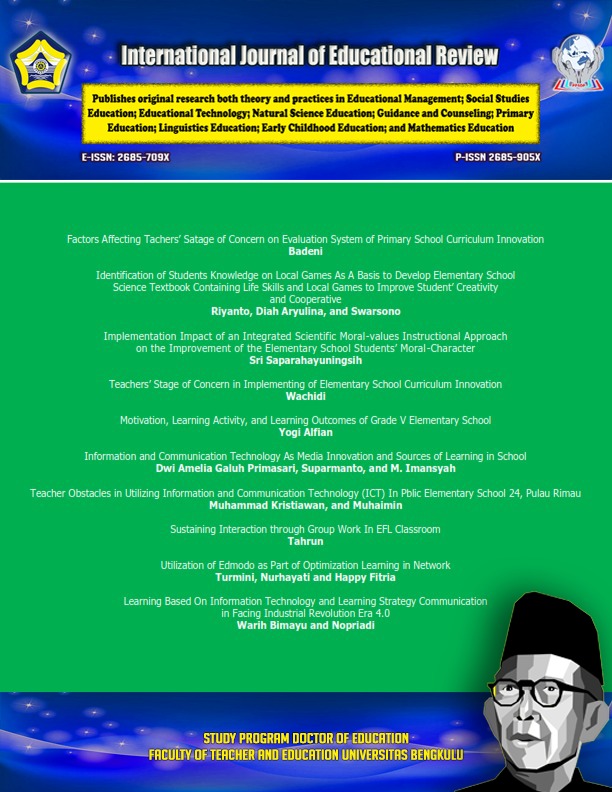Factors Affecting Teachers’ Stage of Concern on Evaluation System of Primary School Curriculum Innovation
DOI:
https://doi.org/10.33369/ijer.v1i2.8835Keywords:
Concern, Innovation, Curriculum EvaluationAbstract
The purpose of the study is to describe the teachers’ stage of concern for the evaluation of primary school innovation and factors affecting teachers’ stage of concern. The approach used in this study was a descriptive study. Data related to factors affecting teachers' stage of concern to the evaluation of primary school curriculum innovation were collected in the form of forum discussion and study of related literature. While data on teacher's stage of concern itself to the evaluation system of primary school curriculum innovation were collected, classified, processed and analyzed by using the norms of the group in the calculation of percentile. The findings of this study were 10 % in a stage of awareness, 14 % in the stage of information; 2 % in the stage of personnel;12 % in the stage of management; 20 % in the stage of consequence;12 % in the stage of collaboration and 20 % in the stage of refocusing. Teachers’ stage of concern to the evaluation of primary school curriculum innovation was low. It was caused by (a) the lack of understanding of primary school teachers on information received, (b) lack of examples and evidence of the benefits of accepted curriculum innovation in school practices, (c) lack of training by trainers in applying new curriculum, (d) so complex in evaluating and (e) the curriculum is continually changing. (f) teacher involvement in implementing program and the training needs (g) adequate time to learn, practice, master and apply what needs to be learned about an curriculum innovation (h) teachers’ commitment to implement the curriculum innovation; (i); principal knowledge of educational change; (j) principals role in carrying out programs; (k) principals' moral support and active participation; (l) collaborative planning by teachers and administrators.References
Ali, S. K., &Baig, L. A., (2012), "Problems and issues in implementing an innovative curriculum in the developing countries: the Pakistani experience", BMC Medical Education, 12 (1), 31. https://doi.org/10.1186/1472-6920-12-31.
Berman, Paul, and Mclaughlin, Milbrey, (1978), Federal Programs Supporting Educational Change, Volume VIII Factors Affecting Change Agents (Santa Monica, Calif. Rand Corporation).
Dupuis, Mary M, and Askov, Eunice N, (1982). An Effective Inservice Model for Content Area Reading in Secondary School, Educational Leadership 40 (October 1982): 48=50
Fenstermacher, Gary D and Berliner, David, (1985), “Determining the Value of Staff Development,” Elementary School Journal 85 (January 1985: 281-3314)
Griffin, Garry, (1983), “Implications of Research for Staff Development.” Elementary School Journal 83 (March 1983): 414-425)
Hall, G E., Wallace, RC, Jr. And Dossett, W A., (1973), A Developmental Conceptualization of The Adoption Process Within Institutional Institutions, University of Texas: Research and Development Center for Teacher Education, Texas
Hall, G., & Hord, S., (1987), Change in schools: Facilitating the Process, State University of New York Press, New York, NY
Hall, G., & Hord, S., (2011), Implementing change: Patterns, principles, and potholes, MA: Allyn and Bacon, Boston.
Hall, G.E. & Louck, F., (1979), Measuring Stage of Concern About The Innovation: Manual for Use of The SoC Questionnaire, The University of Texas: Second Edition, Texas.
Harian Nasional, (2014), Kurikulum Diterapkan Bertahap,14 Desember 2014: 12, Jakarta.
Ika Maryani and Sri Tutur Martaningsih, (2017),“Persepsi Guru Sekolah Dasar Terhadap Sistem Penilaian Pada Kurikulum 2013”, Scolaria, 7(2), 153–164.
Kristiawan, M. (2014). A Model for Upgrading Teachers Competence on Operating Computer as Assistant of Instruction. Global Journal of Human-Social Science Research.
Kristiawan, M., & Elnanda, D. (2017). The Implementation of Authentic Assessment in Cultural History of Islamic Subject. Al-Ta lim Journal, 24(3), 266-276.
Kristiawan, M., Jumeldi, A., Ahmad, S., & Asvio, N. (2016). The Implementation Of Affective Assessment For Islamic Education In High School 1 Pariangan. Research Journal of Social Sciences, 9(4), 1-8.
Law of the Republic of Indonesia Law No. 14 The year 2005 on Teachers and Lecturers. Bandung: Fokusmedia/
McKay, A. B., & Nelson, M. E., (1980), “Inservice training for the curricular change. School Science and Mathematics 80”, (December 1980), 684-690)
Rogers, Everet, M., (2003), Diffusion of Innovation, The Free Press, A division of Macmillan Publishing Co. Inc., New York.
Sarason, Seymour, (1982), The Culture of the School and The Problem of Change, (2nd ed.) Allyn and Bacon, Boston
Seemann, K., (2003), Basic principles in holistic technology education, Journal of Technology Education, 14(2), 28-39
Sherry, L., (1997), “The boulder valley internet project: Lessons learned”, THE (Technological Horizons in Education) Journal, 25(2), 68-73.
Spotts, T.H. (1999). Discriminating factors in faculty use of instructional technology in higher education. Educational Technology & Society, 2(4), 92-99.
Sprague, D., Kopfman, K., & Dorsey, S. (1999). Faculty development in the integration of technology in teacher education courses. Journal of Computing in Teacher Education, 14(2), 24-28.
Susan F Loucks and Harold Patt, (1979). “A Concerns-Based Approach to Curriculum Change,” Educational Leadership 37 (December 1979), 212-2015)
Susan F Loucks and Harold Patt, (1979). “A Concerns-Based Approach to Curriculum Change,” Educational Leadership 37 (December 1979), 212-2015)
Downloads
Published
How to Cite
Issue
Section
License

This work is licensed under a Creative Commons Attribution-ShareAlike 4.0 International License.



